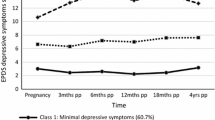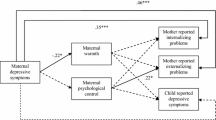Abstract
Objective A higher rate of depressive symptoms is found among mothers of children with disabilities compared to other parents. However, there is a lack of study of mothers with children <3 years of age participating in Early Intervention (EI) programs. This study aims to more fully describe the extent of mood disorders in these mothers including estimated prevalence, severity and factors associated with maternal mental health, using gold standard clinical diagnostic and symptom measures, and test models associating depressive symptoms with contextual factors and child behavior. Methods A cross-sectional study was conducted with 106 women who had at least one child enrolled in EI. Mothers were interviewed and completed reliable, valid measures to evaluate mental health, health status, family conflict, parent–child interaction, self-efficacy, social support, child behavioral problems, hardship, endangerment, and child disability. Descriptive statistics and multivariate analyses were performed. Results We found 8 % of participants met all criteria for a Major Depressive Episode (MDE) with 44 % of the sample reporting a past episode and 43 % endorsing recurrent episodes. Using the CES-D to assess depressive symptom severity approximately 34 % of mothers screened in a clinically significant range. Using linear regression to predict severity of current depressive symptoms demonstrated that current depression severity was primarily predicted by poorer maternal health status, lower self-efficacy and past MDE (p < 0.05). Conclusions for practice A brief assessment of maternal mood, health and self-efficacy are important factors to assess when evaluating how to support mothers of children in EI.
Similar content being viewed by others
References
American Psychiatric Association. (2013). Diagnostic and statistical manual of mental disorders: DSM-5 (5th ed.). Arlington: American Psychiatric Publishing.
Bailey, D. B., Golden, R. N., Roberts, J., & Ford, A. (2007). Maternal depression and developmental disability: Research critique. Mental Retardation and Developmental Disabilities Research Review, 13, 321–329. doi:10.1002/mrdd.20172.
Briggs-Gowan, M. J., Carter, A. S., Irwin, J. R., Wachtel, K., & Cicchetti, D. V. (2004). The brief infant-toddler social and emotional assessment: Screening for social-emotional problems and delays in competence. Journal of Pediatric Psychology, 29, 143–155. doi:10.1093/jpepsy/jsh017.
Bromet, E., Andrade, L. H., Hwang, I., Sampson, N. A., Alonso, J., De Girolamo, G., … Kessler, R. C., et al. (2011). Cross-national epidemiology of DSM-IV major depressive episode. BMC Medicine, 9, 90–106. doi:10.1186/1741-7015-9-90.
Center for Parent Information and Resources. (2015). Early intervention. Retrieved from http://www.parentcenterhub.org/?s=early+intervention.
Ciciolla, L., Gerstein, E. D., & Crnic, K. A. (2014). Reciprocity among maternal distress, child behavior, and parenting: Transactional processes and early childhood risk. Journal of Clinical Child and Adolescent Psychology, 43(5), 751–764. doi:10.1080/15374416.2013.812038.
DeSalvo, K. B., Fisher, W. P., Tran, K., Bloser, N., Merrill, W., & Peabody, J. (2006). Assessing measurement properties of two single-item general health measures. Quality of Life Research, 15, 191–201. doi:10.1007/s11136-005-0887-2.
Farr, S. L., Bitsko, R. H., Hayes, D. K., & Dietz, P. M. (2010). Mental health and access to services among US women of reproductive age. American Journal of Obstetrics and Gynecology, 203, 542e1–542e9. doi:10.1016/j.ajog.2010.07.007.
Feinberg, E., Donahue, S., Bliss, R., & Silverstein, M. (2012). Maternal depressive symptoms and participation in early intervention services for young children. Maternal and child health journal, 16, 336–345. doi:10.1007/s10995-010-0715-3.
Gandek, B., Ware, J. E., Aaronson, N. K., Apolone, G., Bjorner, J. B., Brazier, J. E., … Sullivan, M., et al. (1998). Cross-validation of item selection and scoring for the SF-12 Health Survey in nine countries: Results from the IQOLA project. Journal of Clinical Epidemiology, 51, 1171–1178. doi:10.1016/S0895-4356(98)00109-7.
Hebbeler, K., Spiker, D., Bailey, D., Scarborough, A., Mallik, S., Simeonsson, R., … Nelson, L. (2007). Early intervention for infants and toddlers with disabilities and their families: Participants, services and outcomes: Final report of the National Early Intervention Longitudinal Study (NEILS). Retrieved from http://www.sri.com/sites/default/files/publications/neils_finalreport_200702.pdf.
IBM Corp. (2015). IBM SPSS Statistics for Windows, Version 23.0. [Computer software]. Armonk: IBM Corp.
Jones, S. M., Lamb-Parker, F., Schweder, A., & Ripple, C. (2001). Parent involvement in head start: Context and consequences. Developmental and Contextual Transitions of Children and Families, 243–244.
Ko, J. Y., Farr, S. L., Dietz, P. M., & Robbins, C. L. (2012). Depression and treatment among U.S. pregnant and nonpregnant women of reproductive age, 2005–2009. Journal of Women’s Health, 21, 830–836. doi:10.1089/jwh.2011.3466.
Kroenke, K., Spitzer, R. L., & Williams, J. (2003). The Patient Health Questionnaire-2: Validity of a two-item depression screener. Medical Care, 41, 1284–1294. Retrieved from http://journals.lww.com/lww-medicalcare/pages/default.aspx.
Lindahl, V., Pearson, J. L., & Colpe, L. (2005). Prevalence of suicidality during pregnancy and the postpartum. Archives of Women’s Mental Health, 8(2), 77–87. doi:10.1007/s00737-005-0080-1.
Lovejoy, M. C., Graczyk, P. A., O’Hare, E., & Neuman, G. (2000). Maternal depression and parenting behavior: A meta-analytic review. Clinical Psychology Review, 20(5), 561–592. doi:10.1016/S0272-7358(98)00100-7.
Loyd, B. H., & Abidin, R. R. (1985). Revision of the Parenting Stress Index. Journal of Pediatric Psychology, 10, 169–177. doi:10.1093/jpepsy/10.2.169.
Luszczynska, A., Scholz, U., & Schwarzer, R. (2005). The general self-efficacy scale: Multicultural validation studies. Journal of Psychology, 139, 439–457. doi:10.3200/JRLP.139.5.439-457.
Moos, R. H., & Moos, B. S. (2002). Family environment scale manual: Development, applications, research. (3rd ed.). Menlo Park: Mind Garden, Inc.
Radloff, L. S. (1977). The CES-D scale a self-report depression scale for research in the general population. Applied Psychological Measurement, 1, 385–401. doi:10.1177/014662167700100306.
Rubak, S., Sandbaek, A., Lauritzen, T., & Christensen, B. (2005). Motivational interviewing: A systematic review and meta-analysis. British Journal of General Practice, 55, 305–312. Retrieved from http://bjgp.org/content/55/513/305.
Sheehan, D. V., Lecrubier, Y., Sheehan, K. H., Amorim, P., Janavs, J., Weiller, E., … Dunbar, G. C. (1998). The Mini-International Neuropsychiatric Interview (M.I.N.I.): The development and validation of a structured diagnostic psychiatric interview for DSM-IV and ICD-10. Journal of Clinical Psychiatry, 59, 22–33. Retrieved from http://www.psychiatrist.com/jcp/pages/home.aspx.
Shonkoff, J. P., Hauser-Cram, P., Wyngaarden Krauss, M., Christofk Upshur, C., & Sameroff, A. J. (1992). Development of infants with disabilities and their families: Implications for theory and service delivery. Monographs of the Society for Research in Child Development, 57, 1–163. Retrieved from http://www.jstor.org/stable/1166087.
Singer, G. H. S. (2006). Meta-analysis of comparative studies of depression in mothers of children with and without developmental disabilities. American Journal of Mental Retardation, 111, 155–169. doi:10.1352/0895-8017(2006)111[155:MOCSOD]2.0.CO;2.
Siqveland, T., Olafsen, K., & Moe, V. (2013). The influence of maternal optimality and infant temperament on parenting stress at 12 months among mothers with substance abuse and psychiatric problems. Scandinavian Journal of Psychology, 54, 353–362. doi:10.1111/sjop.12063.
Soper, D. S. (2015). Post-hoc statistical power calculator for multiple regression [Computer software]. Retrieved from http://www.danielsoper.com/statcalc.
Spagnola, M., & Fiese, B. H. (2007). Family routines and rituals: A context for development in the lives of young children. Infants and Young Children, 20, 284–299. doi:10.1097/01.IYC.0000290352.32170.5a.
The National Early Childhood Technical Assistance Center. (2015). Early intervention program for infants and toddlers with disabilities (Part C of IDEA). Retrieved from http://www.nectac.org/partc/partc.asp.
Turney, K. (2012). Pathways of disadvantage: Explaining the relationship between maternal depression and children’s problem behaviors. Social Science Research, 41, 1546–1564. doi:10.1016/j.ssresearch.2012.06.003.
Vega, W. A., Kolody, B., Valle, R., & Hough, R. (1986). Depressive symptoms and their correlates among immigrant Mexican women in the United States. Social Science and Medicine, 22, 645–652. doi:10.1016/0277-9536(86)90037-7.
Wheeler, A., Hatton, D., Reichardt, A., & Bailey, D. (2007). Correlates of maternal behaviors in mothers of children with fragile X syndrome. Journal of Intellectual Disability Research, 51, 447–462. doi:10.1111/j.1365-2788.2006.00896.x.
Wisner, K. L., Sit, D. K., McShea, M. C., Rizzo, D. M., Zoretich, R. A., Hughes, C. L., … & Confer, A. L., et al. (2013). Onset timing, thoughts of self-harm, and diagnoses in postpartum women with screen-positive depression findings. JAMA Psychiatry, 70(5), 490–498. doi:10.1001/jamapsychiatry.2013.87.
World Health Organization. (2015). International classification of diseases. http://www.who.int/classifications/icd/en. Accessed 20 September 2015.
Zimet, G. D., Powell, S. S., Farley, G. K., Werkman, S., & Berkoff, K. A. (1990). Psychometric characteristics of the multidimensional scale of perceived social support. Journal of Personality Assessment, 55, 610–617. doi:10.1080/00223891.1990.9674095.
Acknowledgments
This study was supported by a NC TraCS Pilot award # 550KR41203. NC TraCS is the academic home of the NIH Clinical and Translational Science Award (CTSA) at the University of North Carolina at Chapel Hill (UNC-CH). Matching funding was contributed by the UNC-CH School of Nursing, the UNC-CH School of Medicine, Department of Psychiatry and the UNC-CH Center for Developmental Science. Drs. Martinez and Matsuda were supported by the National Institutes of Health, National Institute of Nursing Research 2T32NR008856 (PI: Mark). Its contents are solely the responsibility of the authors and do not necessarily represent the official views of NIH, NIMH or NINR. The authors acknowledge the assistance of Maureen Baker, Galen Burns-Fulkerson, Evette Cordoba, Rosanna Del La Rosa, Erin Eves, Carrie Fields, Sandra Forrester, Kayoll Galbraith, Leah Gold, Lindsey Hooker, Grace Hubbard, Ahrang Jung, Birnettiah Killens, Desiree La Grappe, Francesca Rourke, Graciela Seila, and Vicky Yeh in study conceptualization, data collection and entry, and Dr. George Knafl for his review of the manuscript.
Author information
Authors and Affiliations
Corresponding author
Ethics declarations
Conflict of Interest
The authors declare that they have no conflict of interest.
Rights and permissions
About this article
Cite this article
Beeber, L.S., Meltzer-Brody, S., Martinez, M. et al. Recognizing Maternal Depressive Symptoms: An Opportunity to Improve Outcomes in Early Intervention Programs. Matern Child Health J 21, 883–892 (2017). https://doi.org/10.1007/s10995-016-2189-4
Published:
Issue Date:
DOI: https://doi.org/10.1007/s10995-016-2189-4




